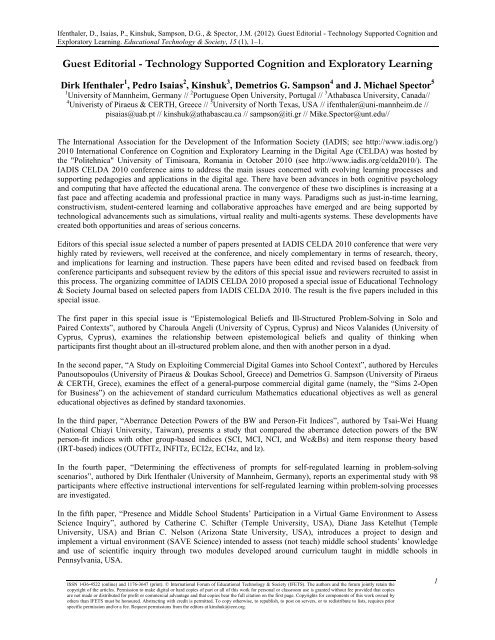January 2012 Volume 15 Number 1 - Educational Technology ...
January 2012 Volume 15 Number 1 - Educational Technology ...
January 2012 Volume 15 Number 1 - Educational Technology ...
Create successful ePaper yourself
Turn your PDF publications into a flip-book with our unique Google optimized e-Paper software.
Ifenthaler, D., Isaias, P., Kinshuk, Sampson, D.G., & Spector, J.M. (<strong>2012</strong>). Guest Editorial - <strong>Technology</strong> Supported Cognition and<br />
Exploratory Learning. <strong>Educational</strong> <strong>Technology</strong> & Society, <strong>15</strong> (1), 1–1.<br />
Guest Editorial - <strong>Technology</strong> Supported Cognition and Exploratory Learning<br />
Dirk Ifenthaler 1 , Pedro Isaias 2 , Kinshuk 3 , Demetrios G. Sampson 4 and J. Michael Spector 5<br />
1 University of Mannheim, Germany // 2 Portuguese Open University, Portugal // 3 Athabasca University, Canada//<br />
4 Univeristy of Piraeus & CERTH, Greece // 5 University of North Texas, USA // ifenthaler@uni-mannheim.de //<br />
pisaias@uab.pt // kinshuk@athabascau.ca // sampson@iti.gr // Mike.Spector@unt.edu//<br />
The International Association for the Development of the Information Society (IADIS; see http://www.iadis.org/)<br />
2010 International Conference on Cognition and Exploratory Learning in the Digital Age (CELDA) was hosted by<br />
the "Politehnica" University of Timisoara, Romania in October 2010 (see http://www.iadis.org/celda2010/). The<br />
IADIS CELDA 2010 conference aims to address the main issues concerned with evolving learning processes and<br />
supporting pedagogies and applications in the digital age. There have been advances in both cognitive psychology<br />
and computing that have affected the educational arena. The convergence of these two disciplines is increasing at a<br />
fast pace and affecting academia and professional practice in many ways. Paradigms such as just-in-time learning,<br />
constructivism, student-centered learning and collaborative approaches have emerged and are being supported by<br />
technological advancements such as simulations, virtual reality and multi-agents systems. These developments have<br />
created both opportunities and areas of serious concerns.<br />
Editors of this special issue selected a number of papers presented at IADIS CELDA 2010 conference that were very<br />
highly rated by reviewers, well received at the conference, and nicely complementary in terms of research, theory,<br />
and implications for learning and instruction. These papers have been edited and revised based on feedback from<br />
conference participants and subsequent review by the editors of this special issue and reviewers recruited to assist in<br />
this process. The organizing committee of IADIS CELDA 2010 proposed a special issue of <strong>Educational</strong> <strong>Technology</strong><br />
& Society Journal based on selected papers from IADIS CELDA 2010. The result is the five papers included in this<br />
special issue.<br />
The first paper in this special issue is “Epistemological Beliefs and Ill-Structured Problem-Solving in Solo and<br />
Paired Contexts”, authored by Charoula Angeli (University of Cyprus, Cyprus) and Nicos Valanides (University of<br />
Cyprus, Cyprus), examines the relationship between epistemological beliefs and quality of thinking when<br />
participants first thought about an ill-structured problem alone, and then with another person in a dyad.<br />
In the second paper, “A Study on Exploiting Commercial Digital Games into School Context”, authored by Hercules<br />
Panoutsopoulos (University of Piraeus & Doukas School, Greece) and Demetrios G. Sampson (University of Piraeus<br />
& CERTH, Grece), examines the effect of a general-purpose commercial digital game (namely, the “Sims 2-Open<br />
for Business”) on the achievement of standard curriculum Mathematics educational objectives as well as general<br />
educational objectives as defined by standard taxonomies.<br />
In the third paper, “Aberrance Detection Powers of the BW and Person-Fit Indices”, authored by Tsai-Wei Huang<br />
(National Chiayi University, Taiwan), presents a study that compared the aberrance detection powers of the BW<br />
person-fit indices with other group-based indices (SCI, MCI, NCI, and Wc&Bs) and item response theory based<br />
(IRT-based) indices (OUTFITz, INFITz, ECI2z, ECI4z, and lz).<br />
In the fourth paper, “Determining the effectiveness of prompts for self-regulated learning in problem-solving<br />
scenarios”, authored by Dirk Ifenthaler (University of Mannheim, Germany), reports an experimental study with 98<br />
participants where effective instructional interventions for self-regulated learning within problem-solving processes<br />
are investigated.<br />
In the fifth paper, “Presence and Middle School Students’ Participation in a Virtual Game Environment to Assess<br />
Science Inquiry”, authored by Catherine C. Schifter (Temple University, USA), Diane Jass Ketelhut (Temple<br />
University, USA) and Brian C. Nelson (Arizona State University, USA), introduces a project to design and<br />
implement a virtual environment (SAVE Science) intended to assess (not teach) middle school students’ knowledge<br />
and use of scientific inquiry through two modules developed around curriculum taught in middle schools in<br />
Pennsylvania, USA.<br />
ISSN 1436-4522 (online) and 1176-3647 (print). © International Forum of <strong>Educational</strong> <strong>Technology</strong> & Society (IFETS). The authors and the forum jointly retain the<br />
copyright of the articles. Permission to make digital or hard copies of part or all of this work for personal or classroom use is granted without fee provided that copies<br />
are not made or distributed for profit or commercial advantage and that copies bear the full citation on the first page. Copyrights for components of this work owned by<br />
others than IFETS must be honoured. Abstracting with credit is permitted. To copy otherwise, to republish, to post on servers, or to redistribute to lists, requires prior<br />
specific permission and/or a fee. Request permissions from the editors at kinshuk@ieee.org.<br />
1

















